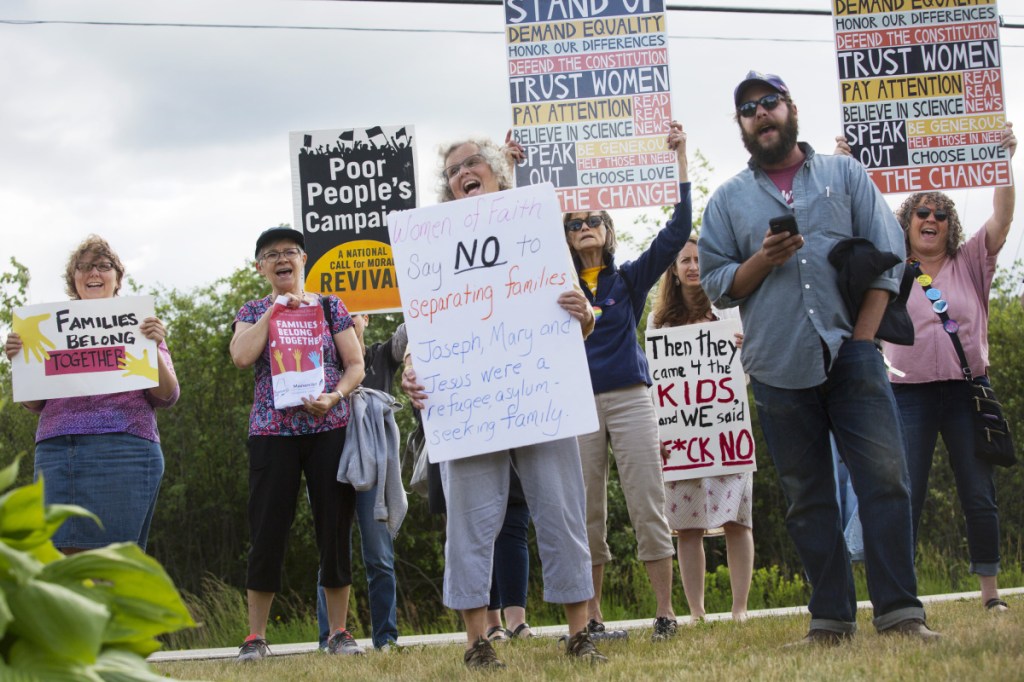On May 14, 2018, some 150 people rallied at the State House in Augusta to bring attention to the failure of then Gov. Paul LePage and the Legislature to expand Medicaid eligibility to tens of thousands more state residents, contravening the voters’ repeatedly expressed demand that they do so.
The rally also responded to the call earlier that spring by the Poor People’s Campaign: A National Call for Moral Revival for 40 days of nonviolent direct action around the issues of systemic racism, poverty, voter suppression, ecological devastation, and the war economy.
After the rally, 22 of the protesters — including clergy of diverse faiths and individuals highly affected by our state’s and our nation’s unjust policies — occupied a portion of the Blaine House grounds in a peaceful act of civil disobedience. Meanwhile, dozens of supporters continued the protest outside the fence with singing, chanting and words of encouragement. Eventually those inside the fence were arrested, taken to the Kennebec County Jail, and charged with trespassing.
I was there on May 14, outside the fence, singing with as much spirit as I could muster, while feeling stunned and ashamed by the display of force being used by law enforcement against these peaceful protesters who were simply calling for justice.
It is because of this protest, the courage and commitment of these protesters, and their efforts to transform policies that have consigned so many to lives of desperation, that I joined the Poor People’s Campaign.
Asked recently how she thinks the country is doing in terms of caring for the needs of those most affected by poverty and systemic racism, Diane Dicranian — a member of the Maine Poor People’s Campaign coordinating committee — said, “I don’t think we’ve come far at all. I think we’ve gone backwards,” she says.
“I think there are more people hungry today. There is more discrimination today and there are certainly less opportunities than Dr. King had hoped for then.”
She’s right.
On Thursday, Feb. 21, at noon, I’m going to the State House in Augusta along with poor and directly impacted people, moral leaders and other allies to demand that our elected leaders in Maine put the needs of poor people first. We’ll be putting lawmakers on notice, demanding action on issues like systemic racism, poverty and inequality, the war economy and militarism, the destruction of the environment, and a corrupt moral narrative that blames the poor for their poverty and disenfranchisement.
Today, the gap between the rich and the poor has grown larger. Extremist politicians are attacking voting rights all across the country. Spending on prisons and the military is skyrocketing, but politicians keep trying to cut funding for basic programs that poor families need to survive. Too many communities across the country lack access to clean air and water.
I am so grateful that we have a new governor and legislature in Maine. Still, we can’t wait in silence hoping these problems will solve themselves. This is why we have been organizing. This is why we are building a modern fusion movement, uniting people from all backgrounds who are willing to stand up, speak out, and even risk arrest until those in power hear us.
We stood together for the 40 days of Moral Action last year. Together we broke through the betrayal of silence. Together we’ve been going broad and deep across Maine, building up our leaders, uniting our communities, erasing lines of division, striving to impact elections and the policy agendas of our state house.
I see people from all backgrounds coming together. And on Feb. 21, we’ll be demanding change with one strong voice that cannot be ignored. We are a new and unsettling force — and we are powerful.
Elizabeth D. Leonard lives in Waterville.
Copy the Story LinkSend questions/comments to the editors.



Success. Please wait for the page to reload. If the page does not reload within 5 seconds, please refresh the page.
Enter your email and password to access comments.
Hi, to comment on stories you must . This profile is in addition to your subscription and website login.
Already have a commenting profile? .
Invalid username/password.
Please check your email to confirm and complete your registration.
Only subscribers are eligible to post comments. Please subscribe or login first for digital access. Here’s why.
Use the form below to reset your password. When you've submitted your account email, we will send an email with a reset code.